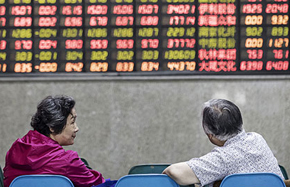Global financial system stable, China's economy brightens a decade after debt crisis
NEW YORK - The international financial system has become stable and global economy is tepidly recovering with China in the lead, after experiencing the world financial crisis which started ten years ago, experts have said.
On Aug 9, 2007, generally considered as the start of the global financial crisis, French Bank BNP Paribas, one of the largest banks in Europe, froze three funds claimed by investors over the US subprime mortgage exposure.
The move sparked the worst financial crisis since the Great Depression in 1929.
China leads recovery
When the global economy faced pressure from the crisis, China stood out and helped to pull the world out from receding.
Ten years on, global economy recovery is on firmer footing and China, the greatest contributor to global economic growths, continues to expand its economy in a rapid pace.
"Global growth continues to trend higher at a tepid rate despite exceedingly low interest rates in developed economies such as the United States, Europe and Japan," Brendan Ahern, chief investment officer of Krane Funds Advisors, told Xinhua on Wednesday.
"China's robust economic readings are a strong indication that the global economy continues to recover from the economic crisis ten years ago," said Ahern.
In the first half of this year, China's economy continued its steady expansion with its gross domestic product (GDP) up 6.9 percent year-on-year, well above economists' estimates, data from the National Bureau of Statistics showed in July.
"China's economy continues to grow at a rate far above global peers," Ahern said.
The International Monetary Fund (IMF) revised up China's 2017 growth at 6.7 percent, 0.1 percentage points higher than its last estimate. Many big banks, like JPMorgan and Citigroup, also raised their annual growth forecasts for China.
"China will continue to play a pivotal role in the global economy," Ahern said.
"We believe domestic consumption will continue to grow in prominence and strengthen China's overall economy," said Ahern.
"Policy makers should be congratulated for their foresight in promoting domestic consumption through economic incentives and supportive reforms."
Long legacy
Nowadays, the aftermath of the credit crunch continues to teach us a lesson in financial regulation.
A decade ago, the credit crash rang as an alarm, and central banks worldwide were desperate to save the global financial system and make it more resilient.
The US Federal Reserve, European Central bank, and their counterparts bought up toxic assets, lowered interest rates and injected liquidity through bond-purchase programs.
The reforms in economic and financial infrastructure, to some extent, led the world economy to a stable recovery since the financial meltdown.
The pickup in global growth recovery remains on track, the IMF said in its latest World Economic Outlook report, maintaining its previous forecast of global growth at 3.5 percent and 3.6 percent respectively for 2017 and 2018.
"The global economy is gradually improving," said Mark Newton, a Newton Advisors owner & technical analyst, "we have certainly started picking up steam, which is a good thing."
Financial institutions have learned to restrict speculative trading thanks to a batch of tightened financial regulations
All major US banks passed stress tests by the Fed and have robust capital levels to withstand a severe recession.
Fed Chair Janet Yellen even said recently that she does not believe that there will be another financial crisis "in our lifetime," and the banking system is "very much stronger."
- Improve financial system to let cash go
- PBOC regulating financial system
- Establish China’s Financial System and Formulate Agricultural Policy between Government and Non-government Sectors(No. 47, 2017)
- Experts stress financial system revamp
- Global financial system must support green growth: UN official


















